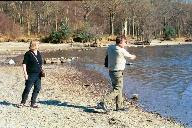Walk around the central area, reorienting ourselves. Where did the Catholic Church go - the one we went to seven years ago? You could see it from the Fardoss, now being renovated. Check in the bookstore at the five star Cham Palace Hotel, but Lonely Planet is no help. Spot our old restaurant, Abou Kamal, on Azem Square, but its sister restaurant, Ali Baba, on the ground floor, has its windows covered with newspaper.
Then down to the souq. You could get fat on the way, as admiring the Syrian pastries and sweet preserved fruit in the shop windows leads to generous and delicious free samples. Hamidiyeh Souq, the main old market, was ancient when St Paul was in Damascus, and it sells everything from gold to perfume to school supplies to socks. There's an ice cream parlour that, Lilly told us, has made its owners billionaires. But we always seem to leave it for a later that never comes, as the souq is a huge maze and we never quite retrace our steps, even when we try. It's bigger than the souq in Sousse (Tunisia) and much more fun. Shops with gold and brocades gleam jewel-like and while offers are constant they're often half-hearted (how many tourists really buy socks?). There's none of the hard edge, almost harrassment.
We circle slowly round the ancient lanes, some covered and some not, toward the old Christian district and Straight St, mentioned in the Book of Acts as the site of St Paul's conversion. As before, the new jostles comfortably against the old, with satellite dishes topping crumbling ancient buildings and tipsy old balconies overhanging shops selling mobile phone cards. But J laments the disappearance of many of the oldest building fronts as the centuries old woodwork is covered with plaster or sometimes wide strips of metal. Will the metal protect the wood? No, he says, water will get between the metal and the wood and the wood will rot faster.
In the evening to Abou Kamal restaurant for dinner. As we leave "Trevor" is watching the unfolding drama of events in Libya and comments on the number of Arab countries in revolt. We're interested in the range of tv chanels that seem to be freely available. Al Jazeera is particularly uncompromising in presenting material that one might have supposed Arab dictatorships were not eager to have citizens view. Syria is a comfortable and seemingly stable coutry, but it's not a democracy - it's illegal, for example, to criticise the president in public. Though there's a fair bit of toleration for religious minorities. Also, interestingly, while the GDP per capita is lower than Egypt's, it seems to be more evenly distributed. Begging is probably less common than in Toronto, and there aren't visible extremes.
We're a bit early at Abou Kamal and it's not terribly full yet, but the other diners are all local families. Snowy linen cloth and a night view of Azem Square. The menu is a delight and we remember it from previous visits. For example the griled bird - further explained as griled local bird. Urban pigeon? Perhaps best not to order, but what might we be missing? There are some partial explanations too. Motable is defined as griled egg plant, yogurt and sesame, while Mahamara is mushtast, red pepper, sesame and oil. These from the dips on the mixed appetizer tray. Delicious, but we never do sort out what they all are, other than the very good humus.
We order a chicken dish with a cheese topped sauce and a mushroom fricassee with bits of lamb. Pass up the "tournedoes (ceeseoregy, or Plin)" - which I eventually translate as "cheese, or egg or plain." No rice included, though there's lots of pita bread and the appetizers were pretty filling. The total doesn't come to much more than the sum of the parts, despite the ominous warning on the menu that "this price doesn't include consumptive fees." At tip time we get two hovering waiters watching as we decide how much to part with. Must have been satisfactory as I get helped on with my jacket.
Back at Happy Nights we ask "Trevor" if there have been any more revolutions. "No," he says, "I think that's enough."




